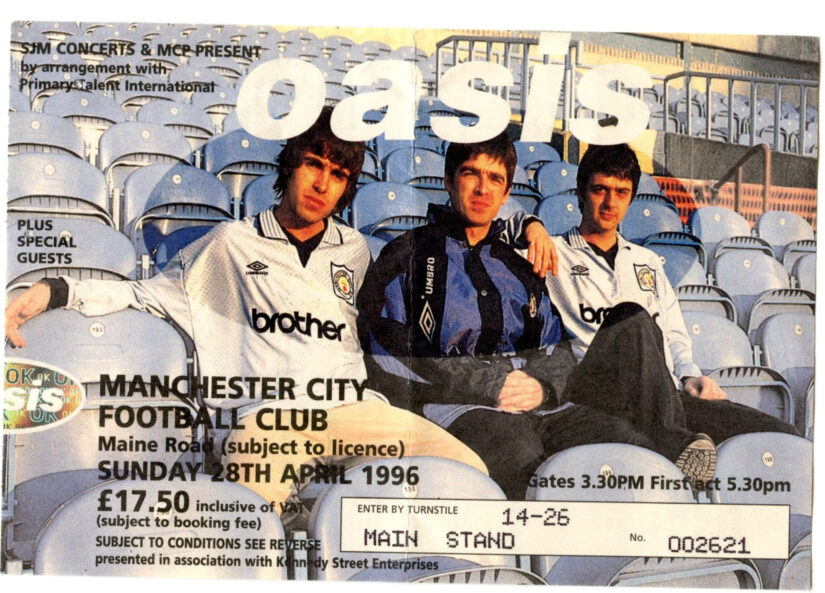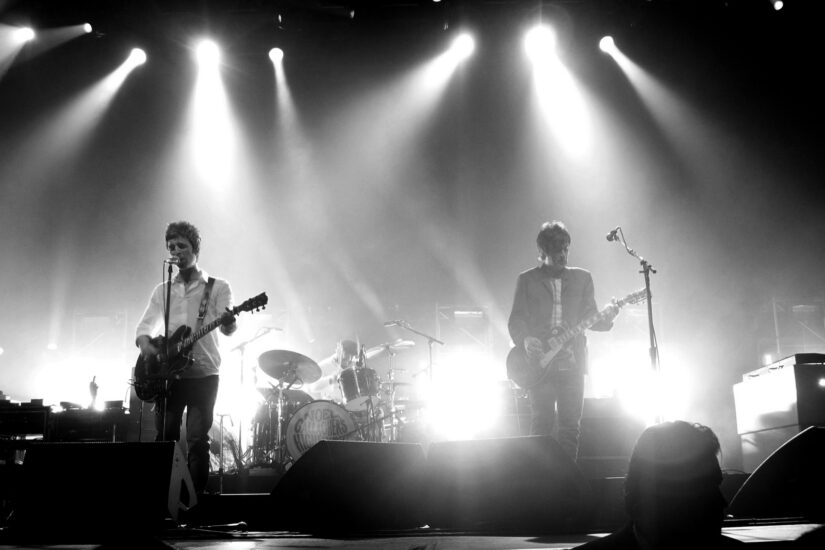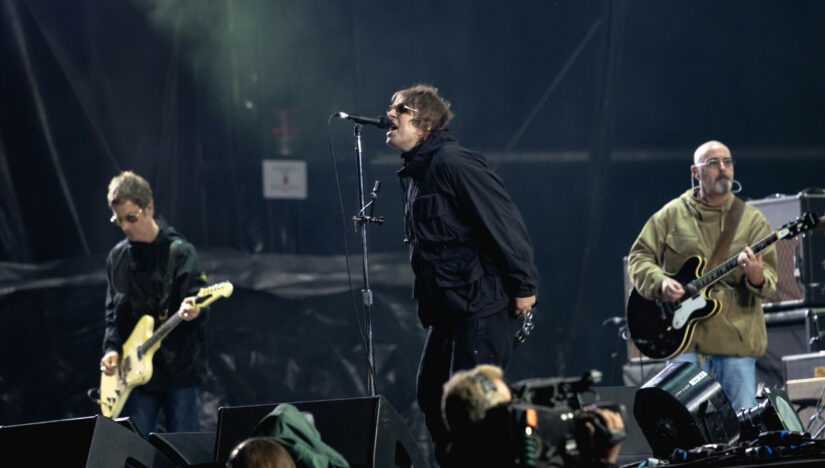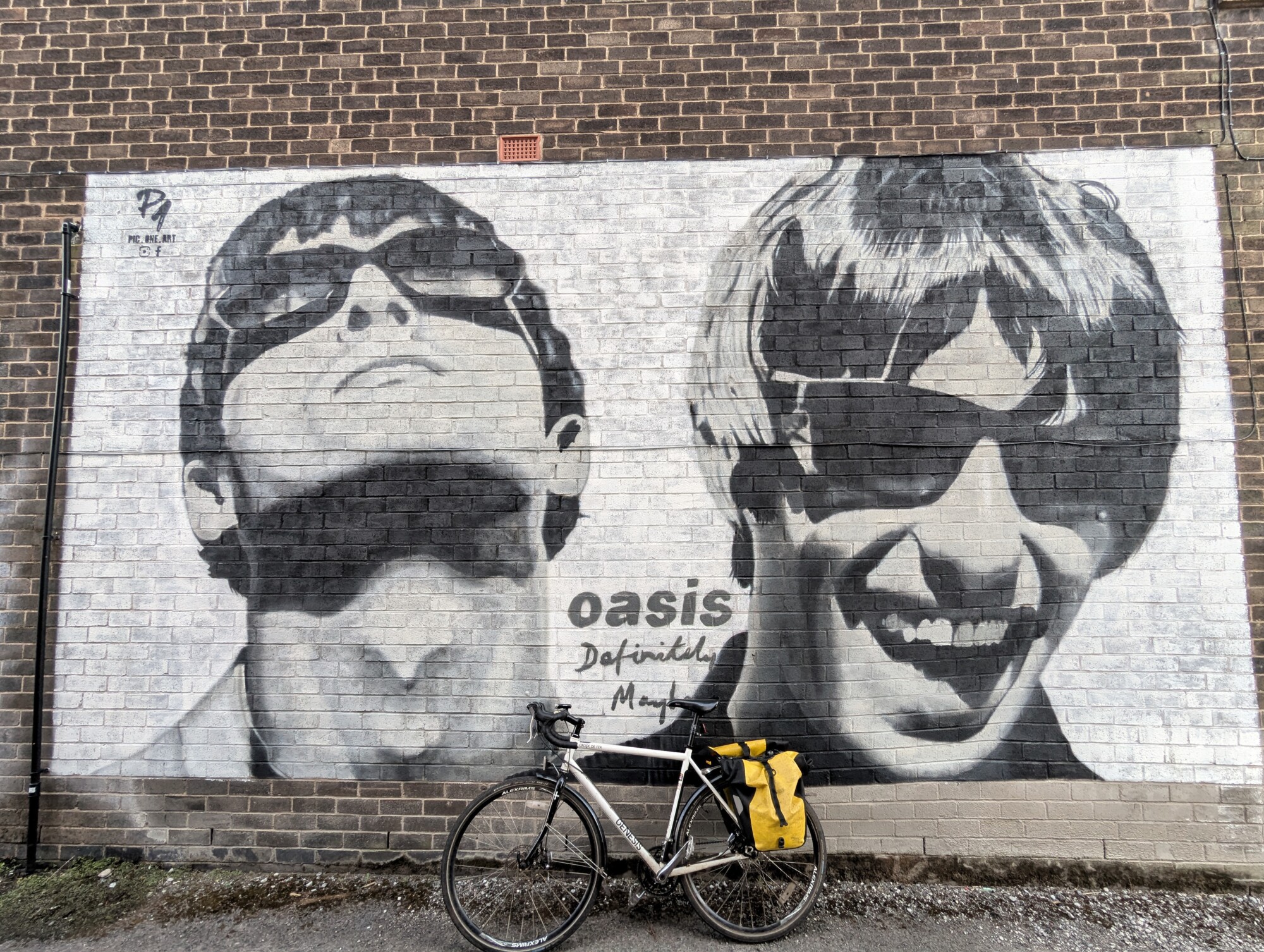Picture by Dunk
Led by Noel Gallagher, the band’s moody songwriter, and his turbulent younger brother Liam Gallagher, the charismatic frontman, Oasis marked the 1990s UK musical scene like no one else. Through a period of musical renaissance of British bands and rock, referred to as Britpop, Oasis captured a period of optimism in the country. The band’s repertoire of stadium anthems that feel extremely personal took them from small clubs to the largest festivals. However, the sour relationship between the brothers led to numerous clashes that eventually ended the band in 2009. Their reunion, three decades since their debut album, places them right back atop the conversation.

Britpop
After the early 1990s dominance of Kurt Cobain and Pearl Jam’s grunge, the British musical scene was ready to move towards homemade sounds. Driven by more positive lyrics, swaggered irreverence, guitar riffs, and melodic anthems, Britpop took over the UK in the mid-1990s. Much of the influence and credit is to be given to the Beatles and Rolling Stones music. This is most visible in Bitter Sweet Symphony from the Verve, which sampled the Rolling Stones to the point of having to credit them as songwriters on the track. Britpop peaked and eventually faded out as the new millennium approached. Blur and Oasis, the two leading bands characterising the movement subsequently evolved their music, and the cultural takeover stopped. But for a brief period, Britpop contributed to the Cool Britannia movement that optimistically swept the country. Tony Blair’s election, the 1996 Euro in England, and the Spice Girls also all played a significant role.
Meet the Gallaghers
Oasis was founded in 1991 when Liam Gallagher joined the band of Paul Arthus, Paul McGuigan, and Tony McCaroll. Liam suggested changing the name from The Rain to Oasis. Later, when they were playing their first gigs in Manchester clubs, Noel Gallagher, Liam’s older brother, went to see the band and proposed to join them. The group accepted, and Noel fundamentally reshaped the musical direction by becoming Oasis’s leader and sole songwriter. Years of writing songs, playing in small venues, and trying to get picked up by a major label followed. Finally, in 1994, Oasis started putting out singles, notably with Supersonic, Live Forever and Cigarettes & Alcohol, which still have not aged to this day. Their first album Definitely Maybe, was released in the same year. As the band started to enjoy its success, it promoted the album by touring intensely. There, the first publicised instances of trouble appeared between the two brothers. The two of them never liked each other, but the rivalry turned to pettiness. It must also be noted that throughout this whole time, until the late 1990s, the band members were often under the influence of cocaine, cigarettes, and alcohol. In 1994, during a concert in Los Angeles, Liam threw a tambourine at Noel, who then quit the band. He found shelter in a San Francisco woman’s home who persuaded him to return to the band. Noel wrote Talk Tonight as a tribute to her. Due to heavy drug use, he does not remember today who she was or as a matter of fact most of the early 1990s.
During the recording sessions for their second album, after another dispute, Liam hit Noel in the studio with a Cricket Bat. Nonetheless, this did not stop Oasis’ ascension. (What’s the Story) Morning Glory?, their second album, was released in October 1995. The album was a hit machine and includes the song most associated with the band; Wonderwall. The record also delivered the festival classic Don’t Look Back in Anger, and the introspectively moody Champagne Supernova. In August 1996, Oasis played two concerts at the Knebworth festival, which would be retrospectively considered the peak of their career and the Britpop era. 2.5 million people applied for tickets; this is equivalent to 4% of the UK population. Given that each concert “only” accommodated 250,000 people, Oasis could have played 18 other shows in front of a quarter of a million people. Noel referred to the event in the 2016 documentary Oasis: Supersonic as “the last great gathering before the birth of the internet”. Today (What’s the Story) Morning Glory? remains the fifth-best-selling album in the UK. Despite some more drama between the brothers, with Liam disappearing just before the recording of an episode of MTV Unplugged and then refusing to tour in the US for a while, the band did not dissolve. At this point, Oasis was the biggest band in the world, leading a cultural movement that had not been seen since the Beatles.

So, how do you go bigger than number one? How do you become cooler than the coolest? This question haunts every successful music act, and in the case of Oasis’ third album, Be Here Now, was an effort to continue an upward trend that eventually had to stop, and it did. While their Britpop rival Blur changed their music style, Oasis decided to go all-in and make it as big as possible in the same genre. Although it was an immense commercial success, it was clear that the creative side did not match it. Most songs are too long, All Around The World’s album version is 9 minutes and 20 seconds, and their mixing with overlays of guitar riffs has divided fans. Noel Gallagher, who wrote the album, has since expressed regrets for its quality. Oasis continued for a decade but never reached its cultural zenith of the two first albums again. Its style changed into alternative rock as well, with four more albums, the last released in 2008.
Later years
The band continued to be culturally important, with the mischiefs of its members sometimes taking as much attention as the music itself. To mention a few, the band’s ongoing almost 30-year-old feud with Robbie Williams, which peaked when the former challenged Liam Gallagher to a fight at the 2000 Brit Awards. Noel’s 1997 comments that “Drugs are like getting up and having a cup of tea in the morning” led to a public outcry. In addition, there was a public clash with Jay-Z after he announced he would headline Glastonbury 2008. Switzerland also took part in the drama in 2000 when, at its biggest open-air, Paléo Festival, an Oasis concert turned sour with angry fans disrupting the concert for a perceived lazy performance. Liam was escorted off stage and the concert was shortly cancelled. Eventually, another fight between Liam and Noel erupted in 2009 before they played at the Rock en Seine festival in Paris. Noel left the band for good, and the two brothers still dispute the origin of that particular altercation.
In 2010 Noel Gallagher formed his own band, Noel Gallagher’s High Flying Birds. The new band released four studio albums with acclaimed critical reception and continued to tour, opening for U2’s Joshua Tree anniversary tours. A stable, maybe quite predictable, but solid solo career with some musical experimentations far from Oasis’s sound is what best describes Noel’s solo career.

For Liam, the journey was more unpredictable. After the end of Oasis, the remaining members joined Liam in his new group Beady Eye. The group released two albums and performed at the 2012 Olympics closure ceremony before disjoining in 2014. By 2014 Liam looked like a relic from the 1990s without any future. He had previously denied wanting to pursue a solo career, but in 2016, he started to announce solo concert dates, here solo meaning with his own name as a stage name. Liam still relies on other composers and songwriters. The release of his first solo album in the summer of 2017 coincided with the Manchester terror attacks that killed 22 people at an Ariana Grande concert. The attacks, in Oasis’ hometown, saw a popular outpour with their song Don’t Look Back in Anger used as an anthem. It was notably sang spontaneously after a minute of silence in the streets of Manchester. Then Liam participated in the charity concert following the attacks as a fatherly figure for the city. Although he did not sing Don’t Look Back in Anger, because it is one of the Oasis songs sung by Noel, leaving Coldplay to perform it in one of its best renditions. This also signalled the depth of the ongoing feud between the two brothers. Liam slammed his brother online for not showing up—a common occurrence between the two, who did not even attend Christmas together with their mother anymore.
Since 2017, Liam has released three solo albums, leaning much more into the Britpop sound of the 1990s than his brother’s experimental pop. Surrounded by new collaborators and writers, this venture was crowned with commercial successes and notable songs like Wall of Glass, Once, or Everything’s Electric. This remains an undeniably highly successful comeback for someone in his mid-life and more than twenty years in his music career. Oasis fans dubbed his music the best for a former member. His outspoken personality, with insults flying all around, became appreciated as refreshing in an era of political correctness for mainstream musicians. His comeback from faded rock star to intergenerational icon is chronicled in the 2019 documentary As It Was.

However, despite those two different successful career paths, everyone cheered for a reunion. Especially Liam in the early 2010s, when his finances were slightly down due to a divorce. However, the much-demanded truce between the brothers did not happen, with insults between the two continuing to fuse in interviews. Their mother even admitted she had given up on trying to make peace between them. The public and fellow musicians did not seem to have taken this route. In 2023, Matty Healy from the 1975 stated, “What are Oasis doing? Can you imagine? Being in potentially right now, still, the coolest band in the world and not doing it cause you’re in a mard with your brother. […] They need to grow up. […] There is not one person going to a High Flying Birds gig or a Liam Gallagher that would not rather be at an Oasis gig”.
Makeover and interrogations
Finally, 30 years after Definitely Maybe was released and 15 years after breaking up, rumours of a makeover started to fly around. Then on August 27, 2024, a stadium tour in the British Isles in the summer of 2025 was announced. More dates will probably be added to this tour and overseas in the Americas and Asia if the demand is felt. The main reason behind this unexpected reunion remains unknown. Despite rumours of the recent Noel Gallagher’s divorce costing him 20 million £ and of a reported hefty paycheck for the tour, the two of them still have enough money and future royalties to live off for decades. The true reason will probably stay hidden for a bit as other questions remain unanswered. Which of the brothers caved in first? But also, whether new music will be released, if the reunion is temporary or permanent, and if other past members will return?
However, there is little doubt about the band’s commercial success. The main sale of tickets started with the cheapest ones at 74£ before dynamic pricing pushed them to more than 400£, with more than 10 million people trying to get tickets. The Gallaghers could earn more in the tour than in their peak years in the 90s. The main driver of this phenomenon is more than 90s nostalgia. Oasis’ music has been able to pierce through different generations, still selling records in mass after their breakup. My experience discovering Oasis is no different. I started listening to Oasis in 2014 through their final compilation album, Time Flies… 1994–2009, while staying in the Brighton agglomeration to learn English. The 15–20-minute ride in a double-decker bus from Hove residential suburbs to the downtown area was the perfect backdrop to listen to the compilation and immerse in the Gallaghers’ work. The combo of tunes that instantly become familiar, made to be played in a stadium, melancholy lyrics delivered the perfect desire for escape and the feeling of one’s youth. Oasis’ passion can only be lived in the UK, as Don’t Look Back in Anger is often played at the end of house parties or at closing times in pubs and clubs and has become a national anthem. You don’t become the soundtrack of a nation for no good reason. With that knowledge, it is no surprise that Oasis tracks rose back to the UK Top 10 chart following their reunion announcement. The quality of their two first albums and B-sides still put them high in the British rock and roll pantheon. The reunion will allow them to play in stadiums, something they could not manage to do as solo artists, and maybe even play in the US, which they never conquered like the Beatles. Most importantly, it will permit them to go back atop the zeitgeist.
Legacy
Nonetheless, it must be asked if the comeback will eventually damage the legacy. Oasis struggled to find their magic after their second album, and those are the songs the public still expects. In a way, the breakup helped the band’s popularity, leading the public to crave them. When the Rolling Stones unofficially broke up in the late 1980s, they had already released 18 albums and reinvented themselves countless times while still staying relevant. Once they reunited, they continued to release new albums, with their latest work, Hackney Diamonds, released just last year. On the other hand, Led Zeppelin ended in 1980, and the surviving members reunited on only three occasions. Here Oasis’ legacy appears to be rooted in the past. They are capable of providing a rare moment of Unity for the UK, but with significant doubt over their capacity to continue after that. Even with a new album, they could not topple their early works, which had become ingrained in the national fabric. Moreover, the Gallaghers have not changed much. Their clothing style has remained the same, their most successful work is still rooted in Britpop, and they still claim to be the last great British band. But do they need to change? Or is their timeless appeal precisely because they have not? As much as the world around them has evolved, perhaps the constancy of Oasis serves as a comforting reminder of a bygone era. The challenge they face is not just in recapturing the magic of their early days but in proving that their relevance endures. If they can strike that balance between nostalgia and innovation, their comeback could solidify their legacy rather than tarnish it. Whatever happens, you would be mad not to be a part of it.



